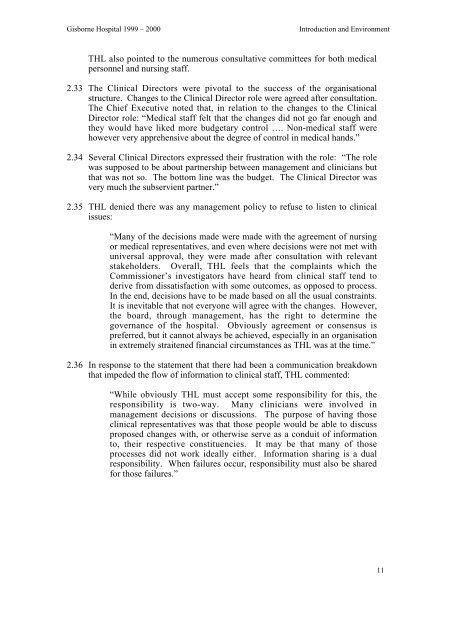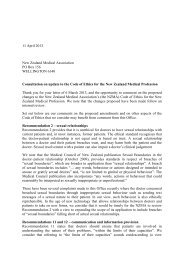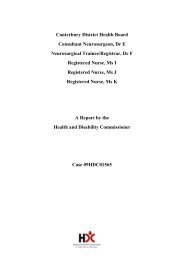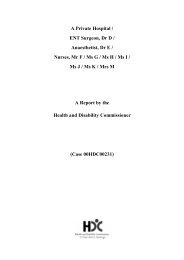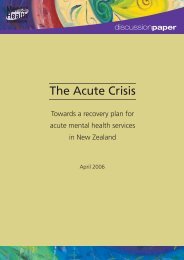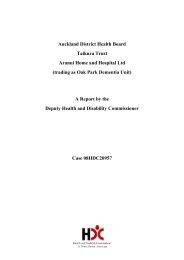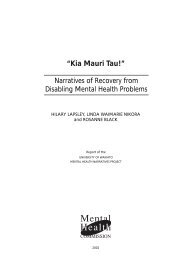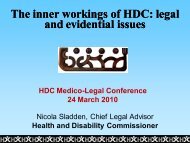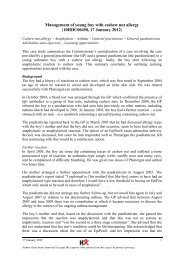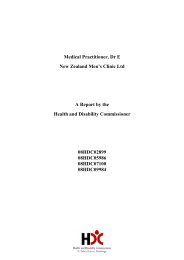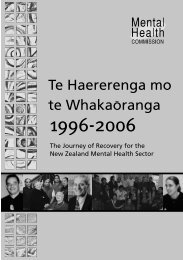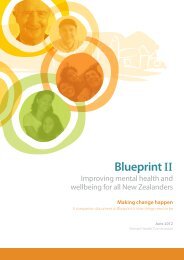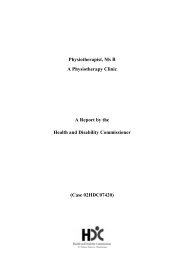Gisborne Hospital Report - Health and Disability Commissioner
Gisborne Hospital Report - Health and Disability Commissioner
Gisborne Hospital Report - Health and Disability Commissioner
Create successful ePaper yourself
Turn your PDF publications into a flip-book with our unique Google optimized e-Paper software.
<strong>Gisborne</strong> <strong>Hospital</strong> 1999 – 2000<br />
Introduction <strong>and</strong> Environment<br />
THL also pointed to the numerous consultative committees for both medical<br />
personnel <strong>and</strong> nursing staff.<br />
2.33 The Clinical Directors were pivotal to the success of the organisational<br />
structure. Changes to the Clinical Director role were agreed after consultation.<br />
The Chief Executive noted that, in relation to the changes to the Clinical<br />
Director role: “Medical staff felt that the changes did not go far enough <strong>and</strong><br />
they would have liked more budgetary control …. Non-medical staff were<br />
however very apprehensive about the degree of control in medical h<strong>and</strong>s.”<br />
2.34 Several Clinical Directors expressed their frustration with the role: “The role<br />
was supposed to be about partnership between management <strong>and</strong> clinicians but<br />
that was not so. The bottom line was the budget. The Clinical Director was<br />
very much the subservient partner.”<br />
2.35 THL denied there was any management policy to refuse to listen to clinical<br />
issues:<br />
“Many of the decisions made were made with the agreement of nursing<br />
or medical representatives, <strong>and</strong> even where decisions were not met with<br />
universal approval, they were made after consultation with relevant<br />
stakeholders. Overall, THL feels that the complaints which the<br />
<strong>Commissioner</strong>’s investigators have heard from clinical staff tend to<br />
derive from dissatisfaction with some outcomes, as opposed to process.<br />
In the end, decisions have to be made based on all the usual constraints.<br />
It is inevitable that not everyone will agree with the changes. However,<br />
the board, through management, has the right to determine the<br />
governance of the hospital. Obviously agreement or consensus is<br />
preferred, but it cannot always be achieved, especially in an organisation<br />
in extremely straitened financial circumstances as THL was at the time.”<br />
2.36 In response to the statement that there had been a communication breakdown<br />
that impeded the flow of information to clinical staff, THL commented:<br />
“While obviously THL must accept some responsibility for this, the<br />
responsibility is two-way. Many clinicians were involved in<br />
management decisions or discussions. The purpose of having those<br />
clinical representatives was that those people would be able to discuss<br />
proposed changes with, or otherwise serve as a conduit of information<br />
to, their respective constituencies. It may be that many of those<br />
processes did not work ideally either. Information sharing is a dual<br />
responsibility. When failures occur, responsibility must also be shared<br />
for those failures.”<br />
11


